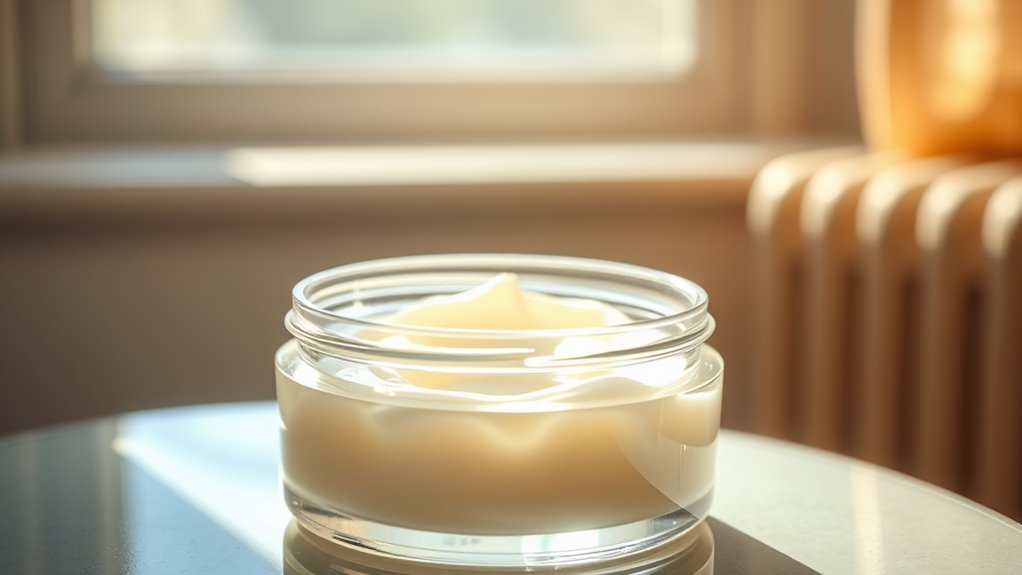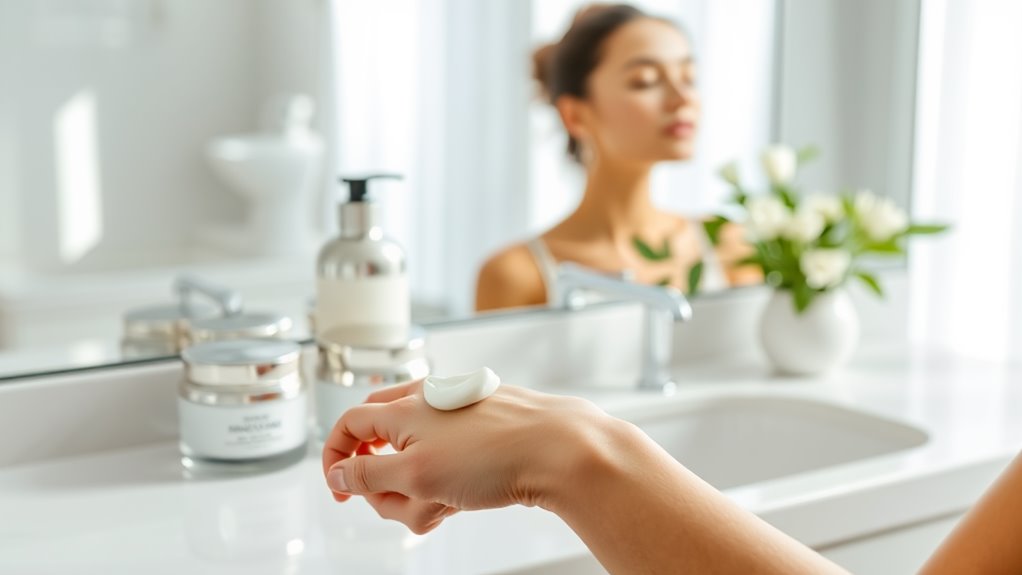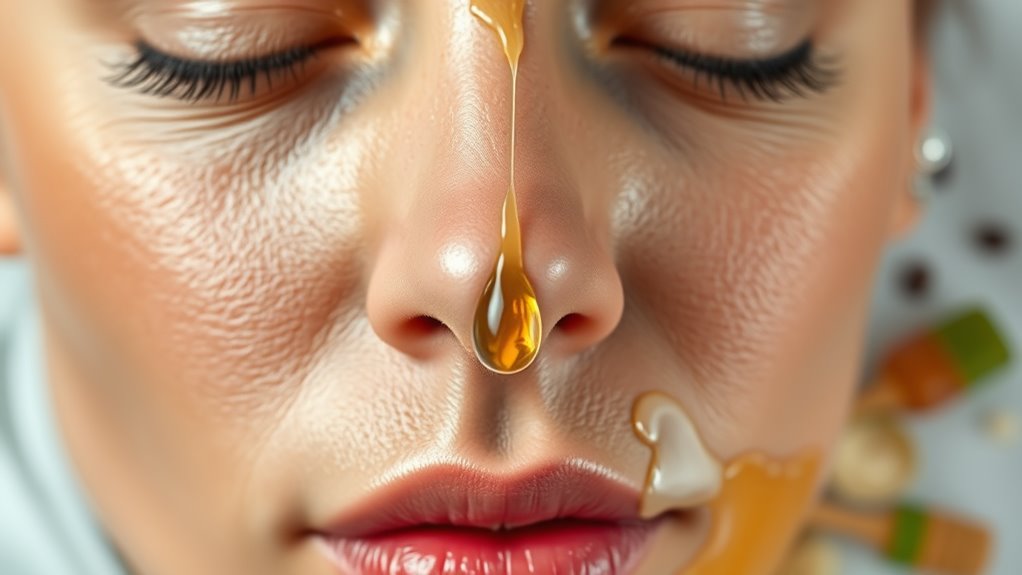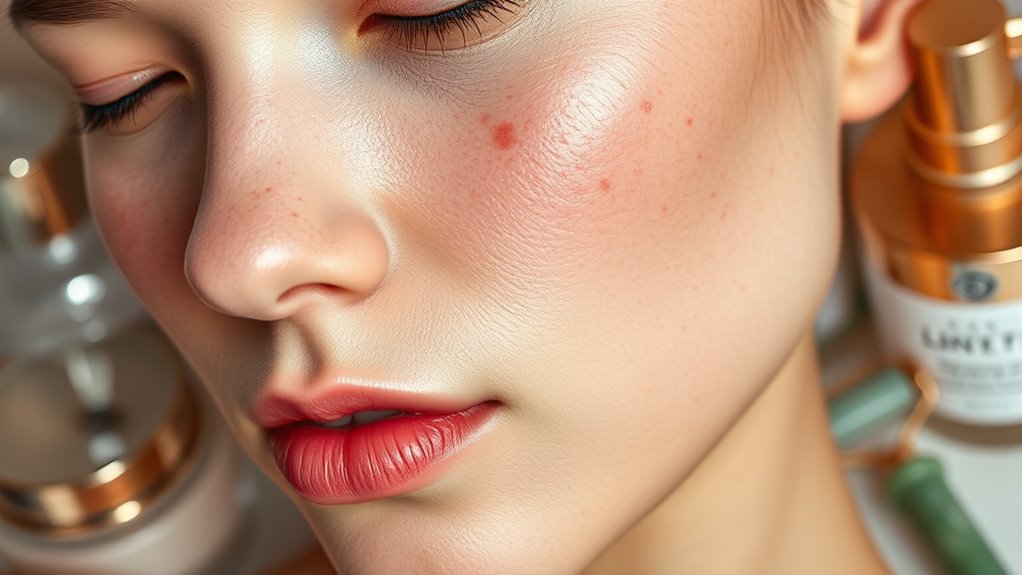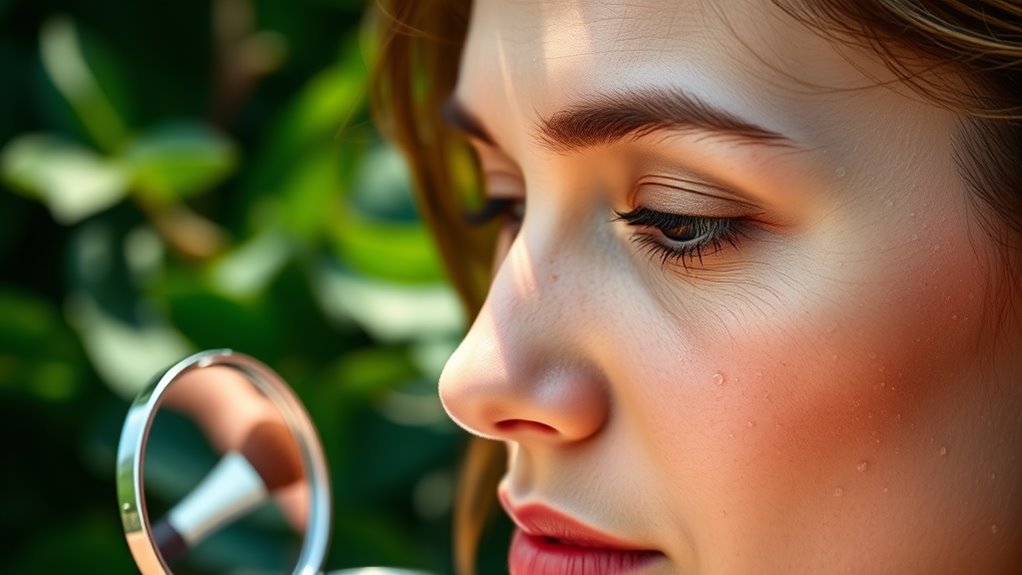The Real Reason Your Moisturizer Isn’t Working
If your moisturizer isn’t working, it might be due to a mismatch with your skin type, improper application, or ineffective ingredients. A clean face and correct layering are essential for maximizing hydration. Environmental factors like humidity can also influence how well products perform. You might believe that over-moisturizing is the issue, but it’s often about finding the right formulation. Discovering more about these aspects can help you achieve the healthy, hydrated skin you desire.
Key Takeaways
- Your moisturizer may not be effective if it’s mismatched to your skin type, leading to improper hydration.
- Improper application techniques, such as applying on a dirty face or in the wrong order, can hinder absorption.
- Environmental factors like humidity and pollution can reduce your moisturizer’s efficacy, requiring adjustments to your skincare routine.
- Ingredients in your moisturizer might not align with your specific skin needs, preventing optimal results.
- Over-moisturizing belief can lead to ineffective routines; finding the right products tailored to your skin is crucial.
Understanding Your Skin Type
Understanding your skin type is crucial for choosing the right moisturizer, especially if you’ve noticed that your current product isn’t delivering the results you want.
An ineffective moisturizer often stems from a mismatch between your skin’s needs and the product you’re using. For instance, if you have oily skin, a heavy cream may clog your pores, leading to breakouts. Conversely, if you have dry skin, a lightweight gel mightn’t provide sufficient hydration.
To master your skincare routine, identify whether your skin is oily, dry, combination, or sensitive. Pay attention to how your skin feels throughout the day. Additionally, using the right cleanser for your skin type can significantly enhance the effectiveness of your moisturizer.
The Importance of Proper Application
While selecting the right moisturizer is essential, how you apply it plays a significant role in its effectiveness. Proper application ensures that your skin absorbs the product effectively, maximizing its benefits. Here’s a quick guide to enhance your technique:
| Step | Tips |
|---|---|
| Cleanse | Start with a clean face to remove impurities. |
| Apply | Use gentle, upward strokes; don’t rub harshly. |
| Layer | If using multiple products, apply from thinnest to thickest. |
Additionally, avoiding common moisturizing mistakes can significantly improve your skin’s hydration levels.
Ingredients That Matter
Even with the right application technique, your moisturizer mightn’t deliver the results you expect if it lacks the right ingredients.
To truly nourish your skin, look for key components like hyaluronic acid, which hydrates and plumps, and ceramides, which strengthen your skin barrier. Glycerin draws moisture in, while antioxidants like vitamin C combat free radicals.
If you’re dealing with dryness, consider ingredients like shea butter or squalane for their emollient properties. Fragrance-free options are crucial for sensitive skin, while non-comedogenic formulations prevent pore clogging.
Always check the ingredient list; a moisturizer without these essentials can leave your skin feeling parched and neglected. Additionally, understanding that oily skin still needs hydration is vital for maintaining a healthy complexion. Invest in products that prioritize these elements, and you’ll notice a remarkable difference in your skin’s health and appearance.
The Role of Humidity and Environment
Humidity and environmental factors can significantly impact how well your moisturizer works. When the air is dry, your skin loses moisture faster, making it crucial to choose a richer formula that can combat this loss.
Conversely, in humid conditions, your skin may feel greasy, leading you to think you don’t need as much hydration. However, even in these environments, your skin still requires moisture to maintain its barrier function.
Pollution and harsh weather can exacerbate skin issues, too, making it essential to adapt your skincare routine accordingly. Additionally, incorporating winter skincare swaps can enhance your routine and ensure your skin remains hydrated and protected during the colder months.
Be mindful of your surroundings; if you notice that your moisturizer isn’t performing as expected, consider how humidity and environmental influences might be playing a role in your skin’s hydration levels.
Layering Products Effectively
When it comes to layering your skincare products, the order of application really matters. Using compatible products can enhance their effectiveness, ensuring your moisturizer actually works as it should. Let’s explore how to achieve the best results by applying your products in the right sequence. Additionally, understanding the optimal order for applying skincare can prevent overwhelming your skin and maximize the benefits of each product.
Order of Application
Understanding the proper order of application can make all the difference in how your moisturizer performs.
When you layer your skincare products correctly, you enhance absorption and effectiveness. Start with the lightest formulas and gradually move to heavier ones. This approach ensures your skin receives all the beneficial ingredients.
- Apply serums first for targeted treatment.
- Use moisturizers after serums to lock in hydration.
- Finish with oils or balms if needed for extra nourishment.
- Give each product a moment to absorb before applying the next.
Product Compatibility Matters
Choosing the right products to layer together is crucial for achieving optimal results in your skincare routine. Not all ingredients play well together. For instance, combining retinol with vitamin C can lead to irritation, while pairing hyaluronic acid with occlusives enhances hydration.
It’s essential to understand the properties of each product. Lightweight serums should precede heavier creams, allowing your skin to absorb the active ingredients effectively. Always patch-test new combinations to prevent adverse reactions.
Additionally, be mindful of fragrance and alcohol, which can disrupt your skin’s barrier. By mastering product compatibility, you’ll create a harmonious skincare regimen that maximizes each product’s benefits, ultimately leading to healthier, more radiant skin.
Prioritize knowledge and experimentation for the best results!
Expiration Dates and Product Freshness
Though you may trust your moisturizer to deliver results, its effectiveness can diminish if it’s past its expiration date.
Using expired products can lead to irritation or ineffective hydration, leaving your skin feeling neglected.
To ensure you’re getting the most out of your moisturizer, keep these points in mind:
- Check the expiration date on the packaging.
- Pay attention to changes in texture, color, or scent.
- Store your products in a cool, dry place to maintain freshness.
- Replace products that show signs of separation or clumping.
Lifestyle Factors Impacting Hydration
Even with a fresh and effective moisturizer, your skin’s hydration can still be impacted by various lifestyle factors. Understanding these influences can help you take control of your skin’s health. Here’s a quick overview of common factors to consider:
| Factor | Impact on Hydration |
|---|---|
| Diet | Low water intake can dehydrate skin. |
| Sleep | Poor sleep affects skin repair and moisture levels. |
| Stress | Stress releases cortisol, which can dry out skin. |
| Environment | Dry or polluted air can strip moisture from your skin. |
The Myth of Over-moisturizing
You might’ve heard that over-moisturizing can harm your skin, but that’s often a misconception.
Understanding your skin’s unique needs is crucial to finding the right balance.
Let’s explore how to differentiate between proper hydration and excessive application.
Understanding Skin’s Needs
Understanding your skin’s unique needs is crucial to effective skincare, especially when it comes to moisturizing. Many people believe that slathering on more moisturizer is the answer, but your skin requires a tailored approach.
To optimize your moisturizer’s effectiveness, consider these key factors:
-
Skin Type: Identify whether your skin is oily, dry, or combination to select the right products.
-
Environmental Factors: Consider the climate and pollution levels that affect your skin’s moisture retention.
-
Hydration Levels: Drink plenty of water; internal hydration impacts your skin’s barrier function.
-
Product Ingredients: Look for ingredients that suit your skin’s needs, like hyaluronic acid for hydration or ceramides for barrier repair.
Mastering these aspects will help you achieve the healthy skin you desire.
Common Moisturizer Misconceptions
Is it possible that the belief in over-moisturizing is holding you back from achieving the skin you want? Many people think slathering on too much moisturizer clogs pores and causes breakouts.
In reality, your skin may be signaling that it needs hydration, not less. When you use a lightweight moisturizer tailored to your skin type, you can actually support its natural barrier and promote balance.
Over-moisturizing isn’t the issue; it’s about finding the right products and application techniques. You might also be overlooking the role of ingredients like hyaluronic acid, which draw moisture into the skin.
Embracing a well-rounded moisturizing routine can elevate your skin health, so don’t let misconceptions steer you away from a radiant complexion.
When to Seek Professional Advice
When should you consider seeking professional advice about your moisturizer? If your skin issues persist despite your best efforts, it’s time to consult a dermatologist. They can provide tailored insights and treatments that over-the-counter products can’t match.
Here are some signs that indicate you should reach out for help:
- Your skin feels consistently dry, flaky, or irritated.
- You notice sudden changes in texture or pigmentation.
- You experience persistent breakouts or rashes.
- Your moisturizer causes adverse reactions like redness or itching.
Professional guidance can help you understand your skin’s unique needs and find the right products.
Don’t hesitate to seek expert advice; your skin deserves the best care possible.
